The Dialectic of Duration
Groundworks
Series Editors: Arne De Boever, California Institute of the Arts; Bill Ross, Staffordshire University; Jon Roffe, University of New South Wales; Ashley Woodward, University of Dundee
What are the hidden sources that determine the contemporary moment in continental thought? This series goes back to the source, publishing English translations of the hidden origins of our contemporary thought in order to better understand not only that thought, but also the world it seeks to understand. The series includes important French, German and Italian texts that form the lesser-known background to prominent work in contemporary continental philosophy. With an eye on the contemporary momenton both world-historical events and critical trendsGroundworks seeks to recover foundational but forgotten texts and to produce a more profound engagement not only with the contemporary but also with the sources that have shaped it.
The Dialectic of Duration , Gaston Bachelard, translated and annotated by Mary McAllester Jones with an introduction by Cristina Chimisso
The Genesis of Living Forms , Raymond Ruyer, translated by Jon Roffe and Nicholas B. de Weydenthal (forthcoming)
The Dialectic of Duration
Gaston Bachelard
Translated and annotated by Mary McAllester Jones
Introduction byCristina Chimisso

London New York
Published by Rowman & Littlefield International, Ltd.
Unit A, Whitacre Mews, 26-34 Stannary Street, London SE11 4AB
www.rowmaninternational.com
Rowman & Littlefield International, Ltd. is an affiliate of Rowman & Littlefield
4501 Forbes Boulevard, Suite 200, Lanham, Maryland 20706, USA
With additional offices in Boulder, New York, Toronto (Canada),and Plymouth (UK)
www.rowman.com
This edition first published by Rowman & Littlefield International, 2016
Translation Mary McAllester Jones 2000
Introduction Cristina Chimisso 2000
Published in French by Presses Universitaires de France as La Dialectiquede la dure
Presses Universitaires de France, 1950
Bibliothque de philosophie contemporaine
108 boulevard Saint-Germain, 75006, Paris
First English translation published by Clinamen Press, 2000
A slightly adapted section of this work previously published in
Jones, Mary McAllester, Gaston Bachelard, Subversive Humanist 1991. Reprinted by permission of the University of Wisconsin Press.
All rights reserved . No part of this book may be reproduced in any form or by any electronic or mechanical means, including information storage and retrieval systems, without written permission from the publisher, except by a reviewer who may quote passages in a review.
British Library Cataloguing in Publication Data
A catalogue record for this book is available from the British Library
ISBN: HB 978-1-78660-058-5
PB 978-1-78660-059-2
Library of Congress Cataloging-in-Publication Data
Library of Congress Control Number: 2016947516
 The paper used in this publication meets the minimum requirements of American National Standard for Information SciencesPermanence of Paper for Printed Library Materials, ANSI/NISO Z39.48-1992.
The paper used in this publication meets the minimum requirements of American National Standard for Information SciencesPermanence of Paper for Printed Library Materials, ANSI/NISO Z39.48-1992.
Printed in the United States of America
Contents
Cristina Chimisso
Page references for the 2nd French edition (France: PUF, 1993) are given in the margin
The purpose of the new Groundworks series is to present English translations of significant texts of European philosophy, with an emphasis on those works which enjoy an influence on the shape and evolution of continental thought which has been felt only at one remove in the Anglophone tradition. The present volume, Gaston Bachelards The Dialectic of Duration , has remained little known in the Anglophone world despite its importance; it represents Bachelards direct counterpoint to the work of his great contemporary, Henri Bergson. Both are pre-eminent names in the history of the French academy, whose work each in its way is testament to the suppleness and adaptability of a broadly phenomenological tradition in the hands of genuinely creative thinkers. Despite the fact that Bergsons reputation waned dramatically in the latter half of his career, this has been recuperated posthumously with equal force, not least due to the influence of his most famous reader, Gilles Deleuze. Bachelards reputation suffered no such reversal; his presence has been an enduring feature of the landscape of continental thought, while his prodigious output has steadily worked its way into translation. It would be fair to say, though, that for readers coming to The Dialectic of Duration first in this translation, and perhaps more familiar with the themes of continuity, intuition and the virtual, as they have settled from Bergsonism into the Anglophone tradition, this of all Bachelards work retains the greatest power to unsettle and to reframe the strands of thought which are in danger today of becoming too readily emblematic of continental thought as such. Yet for all that, there is a great deal to this book which reaches beyond the disputed territory between the two philosophers; it was in this work that Bachelard first marshalled all the components of his visionary philosophy of science, with its steady insistence on the human context and subtle encompassing of the irrational within the rational. As such it represents a privileged point of entry to the work of one of the great modern philosophers of science.
In his discussion of time in The Dialectic of Duration , Gaston Bachelard tackles a wide range of topics and in doing so, faces the translator with a number of challenges. In translating this book my aim has beenas alwaysfidelity both to Bachelards French and to the English language; conflicts of loyalty do of course arise and in such instances the translators first duty must, in my view, be to Bachelard. His ideas are stimulating, thought-provoking and sometimes difficult: smoothing out these difficulties would be a disservice to Bachelard. I have therefore sought to retain the sense one has while reading the French text that he is grappling with new ideas, working his way towards understanding them through language and style that in places reflect their complexity. Bachelards delight in language is also very evident in this book: his choice of unexpected, striking words is often illuminating, helping our understanding, while his fondness for word-play and neologism forces us to attend and to think. The translation of these neologisms offers a particular challenge: I have added notes where I think these may baffle English readers, while seeking to retain in the translation the slight shock of Bachelards neologisms to the French ear.
The range of material Bachelard covers in The Dialectic of Duration has stimulated much discussion with colleagues and friends, and I wish to thank them warmly for the time they have given me and for their interest. As someone who has specialised in Bachelard for many years, often in face of the puzzlement of those more caught up with philosophical and literary fashion, I have been very pleasedsurprised evenby the interest in Bachelard so readily shown by those with whom I have discussed him in the course of this translation. Discussions of Bachelard with my students over the years have shown how thought-provoking he remains, with his capacity for opening to us entirely new perspectives; I would like to thank themand in particular those members of my class of 99 so smitten with Bachelardfor their enthusiasm.
I am indebted to the University of Wisconsin Press for kind permission to use here translated extracts from The Dialectic of Duration that first appeared in my book Gaston Bachelard, Subversive Humanist , published by them in 1991. Some small amendments have been made here to those original translations.
Next page
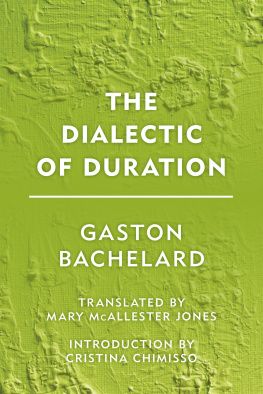
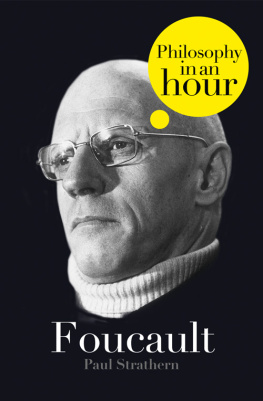
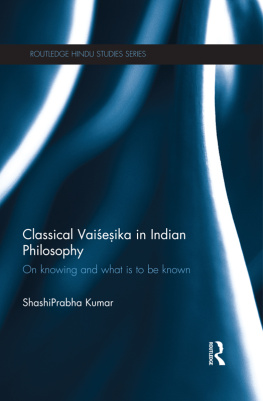

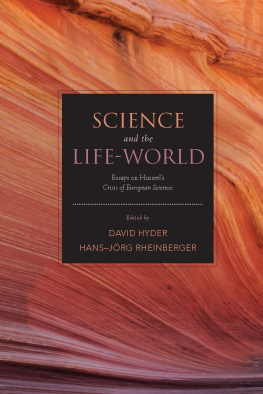
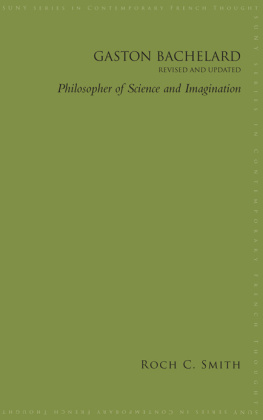


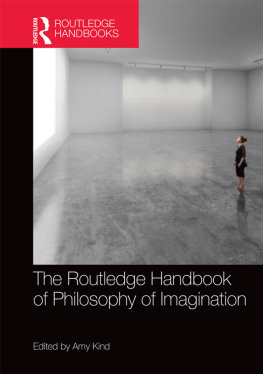
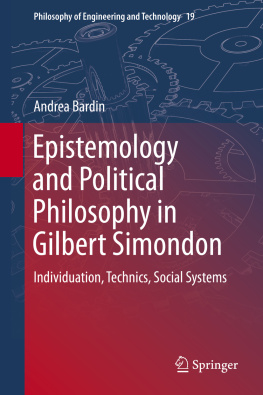

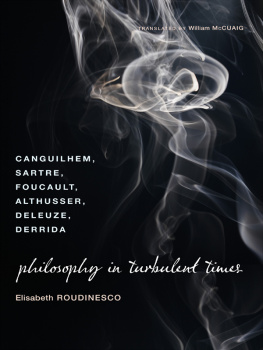

 The paper used in this publication meets the minimum requirements of American National Standard for Information SciencesPermanence of Paper for Printed Library Materials, ANSI/NISO Z39.48-1992.
The paper used in this publication meets the minimum requirements of American National Standard for Information SciencesPermanence of Paper for Printed Library Materials, ANSI/NISO Z39.48-1992.